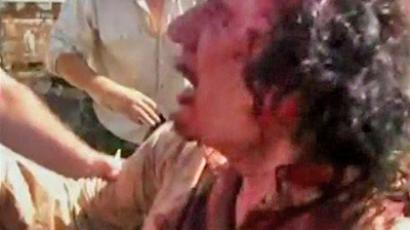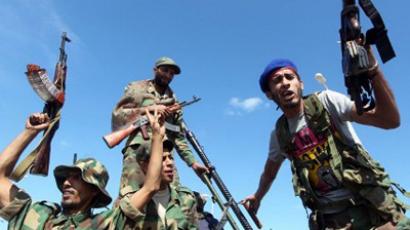Time runs out for effective probe of brutal Gaddafi murder
While Libya has been quick to shake off 40 years of Colonel Muammar Gaddafi's legacy, his children are still waiting for justice. The lawyer of the late leader's daughter has been telling RT why his killing in October still hasn't been investigated.
Aisha Gaddafi has hired Nick Kaufman, an Israeli lawyer, to force the International Criminal Court to investigate the full circumstances of her father’s death. RT: Why have you agreed to take on the case of Aisha Gaddafi?Nick Kaufman: Aisha has a legitimate complaint. Her father was murdered, murdered in a brutal fashion – the whole world saw it. The prosecutor of the International Criminal Court has an obligation to investigate all aspects of the conflict which have been referred to him by the United Nations Security Council, and that would include also the murder of Muammar Gaddafi. Especially since the prosecutor himself has stated that this is a war crime.RT: Where does the case stand at the moment?NK: At the moment I have written to the prosecutor, I’ve asked him whether or not he intends on investigating it. I received a reply [which was] essentially that we are going to see what the Libyan authorities do about it; we’ll give them about five months and by the time I make my next report to the Security Council we’ll see what they’ve done. My view is that that’s in fact leaving it too late. It’s a complex investigation. There’s a need to examine the crime scene, to perform forensic and ballistic analysis, to take evidence from objective witnesses. All these sort of things have to be done now. It’s not the sort of investigation which can be put off for five months and see what happens.RT: Is there any way that you can speed up the investigation?NK: I can keep on writing and pestering the prosecutor and see how far that gets me. Aisha herself has also made an application for victim status. And in certain situations that can actually give her procedural rights. I’ll be examining whether or not, from a legal point of view, that will allow her to petition in the court in order to speed up the investigative process. RT: Why is the ICC so reluctant to speed up the investigation?NK: The general rule at the ICC is what’s called “the rule of complementarity.” That means that domestic state authorities, if they are capable of performing an investigation, should be left to do so. In the present instance, we don’t believe that the Libyan authorities as they stand at present have the will and capacity to carry out such an investigation. And that’s why we are calling for an investigation to be conducted immediately. RT: The ICC issued a warrant to prosecute Gaddafi in June of last year, and then in October, he was killed. Shouldn’t the ICC be willing to learn what happened to the suspect of its own investigation despite what the Libyan government says and does?NK: It is an obligation on the Office of the Prosecutor to investigate all aspects of the conflict. At the present moment in time no-one from the Libyan authorities has put forward a concrete plan for bringing, let’s say, Saif al-Islam to justice and prosecuting him under the rule of law. Given that that’s in fact the case I would’ve thought that the obligation rests with the Office of the Prosecutor to ensure that the “Libyan affair,” as I may call it, is investigated, conducted and prosecuted before the International Criminal Court.RT: What is your interaction with Aisha and how is she doing?NK: I have daily interaction with her. Her situation is not simple. She is currently under some form of restriction on her freedom of movement. On the other hand she is grateful to the Algerian authorities for offering her some form of humanitarian protection. She’s severely traumatized by the murder of her father and of her brother Mutassim; two brutal murders which were witnessed by the whole world on various video clips.RT: What are her plans, is she seeking asylum anywhere else? NK: I can’t comment on that at the present moment in time. RT: Is she following what is happening with her brother, Saif al-Islam?NK: Of course she is and it seriously concerns her. She regrets the fact that Saif al-Islam hasn’t been afforded legal representation and she hopes it will happen in the very near future.RT: Do you think Saif al-Islam will get a fair trial in Libya?NK: That is a very sensitive issue. There’s nothing at the present moment in time to make me believe that a fair and effective trial can be conducted in Libya. I base that on the fact that the Libyan authorities were ordered by the International Criminal Court to file a response to a pre-trial chain for handling the matter by January 10. [I base that on] information concerning Saif al-Islam’s status and what the Libyan authorities’ intentions are in respect to him. The Libyan authorities requested a postponement for filing that response, citing security concerns. My belief is that if security concerns are so serious that they prevent the Libyan authorities from filing a response to a court order, then […] the same security considerations will prevent a fair and effective trial. In other words, the Libyan authorities should be ensuring that Saif al-Islam is handed over to The Hague in accordance with the arrest warrant. RT: What really needs to be done to establish the truth, and can it be established at all?NK: Of course the truth can be established. And if the Office of the Prosecutor will be serious it would have initiated an immediate investigation, especially bearing in mind that the prosecutor has gone on the record and stated this was in fact a potential war crime. We shouldn’t be sitting here today and talking about why the investigation is not taking place. It should’ve started a few days after the murder itself, even less – on the very same day.RT: What does it really take to investigate a crime like this?NK: This is a complex investigation.It’s a crime of murder. It’s a crime which the investigators of the Office of the Prosecutor are fully qualified to investigate. Let us not forget that the Office of the Prosecutor contains the best investigators in the world. As I previously stated, [the investigation] would involve forensic analysis of the crime scene, ballistic analysis of the crime scene, it would involve taking detailed statements from objective and independent witnesses. It would also involve a proper autopsy of Muammar Gaddafi himself and of Mutassim Gaddafi. One question that I do have is why, after the murder, the Office of the Prosecutor didn’t volunteer one of its own forensic pathologists, at least to assist in the performance of the autopsy. That didn’t happen. It is a complex investigation, but it is by no means an investigation that the Office of the Prosecutor itself could not have carried out immediately.














